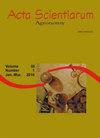萌发期和苗期干旱条件下番茄渗入系的多性状选择
IF 1.2
4区 农林科学
Q3 AGRONOMY
引用次数: 1
摘要
要被认为是耐旱的,番茄品种必须在植物生长的所有发育阶段都表现出一定程度的耐旱性。由于耐旱性是一种特定阶段的现象,基因型评估必须在所有发育阶段单独进行。本研究采用基于因子分析和基因型-理想型距离的多性状指数(FAI-BLUP指数),根据番茄萌发期和苗期对干旱胁迫条件的耐受性对49个番茄基因型进行了适当的排序。以干旱敏感品种M82和耐旱品种秋葵(Solanum pennellii)野生加入品种LA 716为材料,将47个基因渐渗系的种子分别置于对照蒸馏水浸泡和干旱聚乙二醇(PEG)溶液(-0.3 MPa)浸泡条件下。PEG诱导的干旱胁迫对种子萌发和生长性能相关的9个性状均有显著影响;茎长(SL)、总长度(TL)、初发芽率(IGP)、终发芽率(FGP)、萌发速度指数(GVI)和发芽率(GR)均降低。与此相反,干旱胁迫增加了根冠比(R/S)和萌发时间(T50)。根长(RL)受干旱的影响较小,在某些基因型中甚至有所增加。不出所料,LA 716最接近耐旱性理想型。萌发期抗旱能力最强的是IL 1-4-18、IL 2-3、IL 1-2、IL 9-2和IL 10-1。这些结果将为培育抗旱番茄品种的育种人员提供指导。本文章由计算机程序翻译,如有差异,请以英文原文为准。
Multi-trait selection of tomato introgression lines under drought-induced conditions at germination and seedling stages
To be considered drought-tolerant, a tomato cultivar is required to present some level of tolerance at all developmental stages of plant growth. Since drought tolerance is a stage-specific phenomenon, genotype assessment must be performed separately at all developmental stages. In this study, we used a multi-trait index based on factor analysis and genotype-ideotype distance (FAI-BLUP index) to properly rank 49 tomato genotypes according to their tolerance to drought stress conditions at germination and seedling stages. Seeds of 47 introgression lines, which cultivar M82 is considered drought-sensitive, and the Solanum pennellii wild accession LA 716, which is considered drought-tolerant, were subjected to a control condition, where seeds were soaked in distilled water, and a drought condition, where seeds were soaked in a polyethylene glycol (PEG) solution (-0.3 MPa). Drought stress, induced by PEG, had a significant impact on all nine germination and growth performance-related traits; there was a reduction in shoot length (SL), total length (TL), initial germination percentage (IGP), final germination percentage (FGP), germination velocity index (GVI), and germination rate (GR). In contrast, the root-to-shoot ratio (R/S) and time to reach 50% germination (T50) increased under drought stress. Root length (RL) was less affected by drought, and in some genotypes, it was even increased. As expected, LA 716 ranked closest to the drought tolerance ideotype. IL 1-4-18, IL 2-3, IL 1-2, IL 9-2, and IL 10-1 were the most drought-tolerant at the germination stage. These results will serve as guidance for breeders who are aiming at developing drought-resistant tomato cultivars.
求助全文
通过发布文献求助,成功后即可免费获取论文全文。
去求助
来源期刊

Acta Scientiarum. Agronomy.
Agricultural and Biological Sciences-Agronomy and Crop Science
CiteScore
2.40
自引率
0.00%
发文量
45
审稿时长
>12 weeks
期刊介绍:
The journal publishes original articles in all areas of Agronomy, including soil sciences, agricultural entomology, soil fertility and manuring, soil physics, physiology of cultivated plants, phytopathology, phyto-health, phytotechny, genesis, morphology and soil classification, management and conservation of soil, integrated management of plant pests, vegetal improvement, agricultural microbiology, agricultural parasitology, production and processing of seeds.
 求助内容:
求助内容: 应助结果提醒方式:
应助结果提醒方式:


